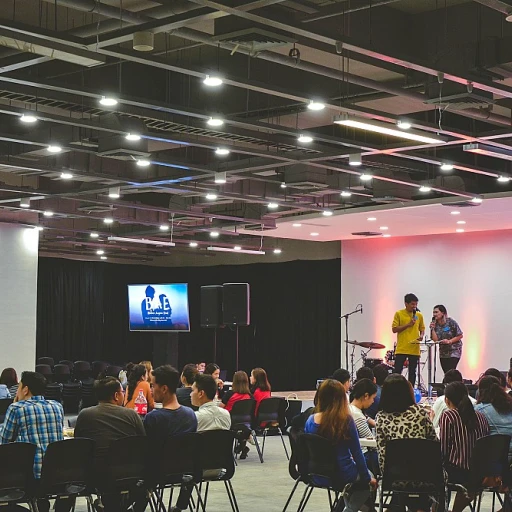
Understanding the DEI Consultant's Role
Clarity in DEI Consulting Roles
Understanding the distinct role of a DEI consultant is crucial in the evolving landscape of human resources. A DEI consultant serves as an essential bridge between diversity goals and actionable strategies within organizations. These consultants are experts in crafting inclusive initiatives that foster a sense of belonging, equity, and diversity among employees. DEI consultants help organizations by assessing current culture and pinpointing areas that need improvement to become more inclusive workplaces. By offering consulting services, they guide HR leaders through complex diversity inclusion pathways, ensuring sustainable, long-term growth in organizational culture and practices. Furthermore, they play a pivotal part in designing and implementing diversity equity and inclusion programs. These programs aim not only to hire DEI but also to weave an inclusive mentality into the very fabric of the workplace, impacting everything from racial equity to hiring practices. It's important to note how DEI consultants differ from other HR roles, focusing on embedding equity inclusion at every level of the organization. The consultant's role involves providing tailored strategies that align with a company's unique objectives, requiring a deep understanding of diverse organizational needs. Explore more on understanding the scope of supervision in a Chief Human Resources Officer career to see how strategic oversight links intimately with effective DEI consultancy. Through training and leadership, consultants can shift organizational mindsets and implement long-lasting DEI strategies applicable across various sectors. This journey towards a comprehensive DEI initiative not only enhances the work environment but also strengthens the overall performance of the organization by unlocking the potential of a diverse employee base.Integrating DEI Strategies into HR Leadership
Infusing DEI Elements into HR Practices
Integrating Diversity, Equity, and Inclusion (DEI) strategies into Human Resources (HR) leadership is essential for fostering a culture that values every employee, not just a select few. The evolving role of a Chief Human Resources Officer (CHRO) now places significant emphasis on promoting a diverse and inclusive work environment. This task often calls for the expertise of a DEI consultant, whose insights are invaluable in the HR domain. To effectively infuse DEI elements into HR practices, organizations should consider the following approaches:- Comprehensive DEI Assessment: A consultant will first assess the existing policies and practices to pinpoint areas where diversity and inclusion are lacking. This assessment forms a bedrock for tailored DEI strategies.
- Strategic Hiring and Training: Ensuring diversity in recruitment processes and providing inclusive training programs for employees can significantly improve representation and awareness within the workforce. DEI consultants help organizations devise strategies that target diverse talent pools and nurture inclusive training sessions.
- Creating Inclusive Policies: Altering or formulating organizational policies that support equity and inclusion is crucial. These policies should address systemic biases and barriers within the organization and propose actionable revolutionary changes.
- Promoting an Inclusive Culture: Fostering an inclusive workplace culture involves more than just hiring diverse individuals. It requires ongoing DEI efforts to cultivate a sense of belonging among all employees. This can include leadership training, employee resource groups, and regular inclusion surveys.
- Measuring DEI Success: Establishing metrics for tracking the success of DEI initiatives helps maintain momentum and accountability. A DEI consultant assists organizations by setting up systems to measure change over time, ensuring the long-term impact of DEI strategies.
Challenges Faced by CHROs in DEI Implementation
Overcoming Obstacles in Implementing DEI Strategies
The journey to establishing an inclusive culture within organizations is layered with challenges, especially for Chief Human Resources Officers (CHROs). These leaders are tasked with integrating Diversity, Equity, and Inclusion (DEI) strategies into the core of business operations. Here are some key hurdles they face:- Resistance to Change: One of the most persistent challenges is the resistance to change among employees and even leadership. A DEI consultant will have the expertise to address these concerns by articulating the long-term benefits of an inclusive workplace. True transformation requires patience and strategic engagement.
- Lack of Resources: Many organizations may struggle with allocating sufficient resources for DEI efforts. CHROs often need to creatively maneuver within budget constraints or advocate for necessary resources that support diverse initiatives. Partnering with DEI consultants can offer innovative solutions and consulting services tailored to organizational needs.
- Inadequate Training: Employees may not understand the value of diversity equity and inclusion training until its benefits are tangible. CHROs can resolve this by facilitating programs that highlight real-world applications and successes. Mastering the art of organizational management can greatly assist in this endeavor as well.
- Metrics and Accountability: Measuring the success of DEI strategies is complex. CHROs must develop robust metrics and accountability systems to track progress. Transparent reporting helps maintain momentum and showcases growth to both internal and external stakeholders.
Skills Required for Effective DEI Consulting
Essential Skills for Becoming a DEI Consultant
Becoming an effective DEI consultant requires a particular set of skills, which enable the consultant to foster diversity, equity, and inclusion within organizations. These skills are crucial for helping organizations navigate the complex landscape of DEI and building an inclusive workplace culture.- In-Depth Knowledge of DEI Practices: A comprehensive understanding of diversity, equity, and inclusion is vital. Consultants must be well-versed in DEI initiatives and strategies to advise organizations effectively and provide relevant consulting services.
- Strong Communication Skills: Effective communication is critical for sharing DEI efforts with employees and stakeholders. A successful consultant will possess the ability to articulate DEI concepts clearly and foster open conversations about inclusion and equity.
- Analytical Skills: Equally important is the ability to analyze an organization's culture and identify areas that need improvement. This involves collecting and interpreting data to inform DEI strategies and gauge the success of DEI programs.
- Change Management Expertise: Facilitating change is at the core of DEI consulting. Consultants should be skilled in developing strategies that promote long-term cultural shifts towards a more inclusive environment.
- Empathy and Emotional Intelligence: Understanding the diverse backgrounds and experiences of employees helps in forming tailored inclusion efforts. DEI consultants must exhibit high emotional intelligence to connect effectively with people from various walks of life.
- Training and Development: The ability to design and deliver impactful DEI training programs is vital. A consultant helps employees understand and embrace the principles of diversity inclusion within the workplace.
Case Studies: Successful DEI Initiatives
Real-world Examples of Diversity Success
Diversity, equity, and inclusion (DEI) initiatives have become pivotal in reshaping the workplace culture within organizations globally. Several organizations have embarked on a journey towards building a more inclusive workplace with the help of skilled DEI consultants. These consultants play an instrumental role in spearheading DEI strategies and initiatives that not only promote diversity but also ensure equity and inclusion are ingrained in the organizational ethos. One such successful initiative is seen within a tech giant that faced criticism for its lack of racial diversity. By hiring DEI consultants, the organization undertook a comprehensive overhaul of its culture and implemented strategic training programs tailored to address unconscious biases. The consultants helped guide leadership in recognizing barriers to inclusion while devising strategies that promoted an equitable work environment for all employees. This led to changes in hiring practices, resulting in a more diverse workforce that reflects a range of perspectives and talents.Consultants Bolstering Long-term Inclusiveness
In a different scenario, a financial institution known for its traditionally homogeneous leadership structure partnered with DEI consultants to transform its cultural landscape. This partnership helped the institution to not only recognize the importance of diversity inclusion in leadership but also create programs that champion racial equity. Through extensive DEI consulting services, the organization launched several ongoing DEI efforts. These efforts included employee resource groups and mentorship programs designed to support underrepresented employees. The consultant's role was crucial as they conducted regular assessments, ensuring these initiatives effectively advanced the organization’s mission to foster an inclusive corporate environment.Creating a Unified Culture through DEI Programs
Furthermore, DEI consultants were integral in a multi-industry company that sought to merge diverse cultures resulting from multiple acquisitions. By deploying DEI strategies aimed at cultural synergy, the consultants addressed friction points through bespoke training and inclusion programs. These efforts were designed to instill a unified company culture while respecting existing cultural identities. As a result, the organization not only preserved diversity within its ranks but also built a stronger, more cohesive culture, demonstrating how DEI initiatives, when effectively implemented, can become a cornerstone for achieving long-term organizational harmony. These case studies exemplify the essential role DEI consultants play in helping organizations embrace a culture of diversity and inclusion that benefits employees and strengthens organizational resilience. By learning from these success stories, organizations are better positioned to integrate DEI strategies that result in meaningful and sustained change.Future Trends in DEI and HR Leadership
Emerging Trends in DEI and HR Leadership
As organizations across industries strive for greater diversity and inclusion, the role of DEI consultants continues to evolve, playing a crucial part in shaping the future of HR leadership. Companies increasingly realize that implementing diversity equity and inclusion strategies is not a one-time effort but a continuous journey requiring commitment and adaptability.
One significant trend is the focus on integrated DEI strategies that align directly with an organization's business objectives. DEI is no longer a standalone initiative but is embedded into the overall culture, helping organizations drive meaningful change. Furthermore, as businesses prioritize an inclusive workplace, there is a growing recognition of the importance of leadership buy-in and accountability at all levels, ensuring that these efforts are sustainable and impactful.
In addition, technology plays a vital role in advancing DEI initiatives. Analytics tools allow organizations to track progress, identify gaps, and measure the impact of their inclusion efforts. This data-driven approach enables consultants to provide more accurate insights and strategies, helping companies to refine their programs and policies continually.
The importance of comprehensive training programs continues to take center stage, equipping employees with the knowledge and skills needed to foster inclusive environments. DEI consulting services often include ongoing education and workshops, centered on understanding unconscious biases, promoting racial equity, and developing a culture of respect and acceptance.
Moreover, as remote and hybrid work models become more common, there is an increasing need for organizations to adapt their DEI approaches to ensure that inclusion extends beyond physical office spaces. The dynamics of remote work present unique challenges and opportunities for implementing inclusive practices in a distributed workforce.
Overall, the future of DEI in HR leadership lies in a proactive and holistic approach, where DEI consultants play a pivotal role in guiding organizations toward a more equitable and diverse future. These efforts require a long-term commitment and a nuanced understanding of the evolving cultural landscape.













